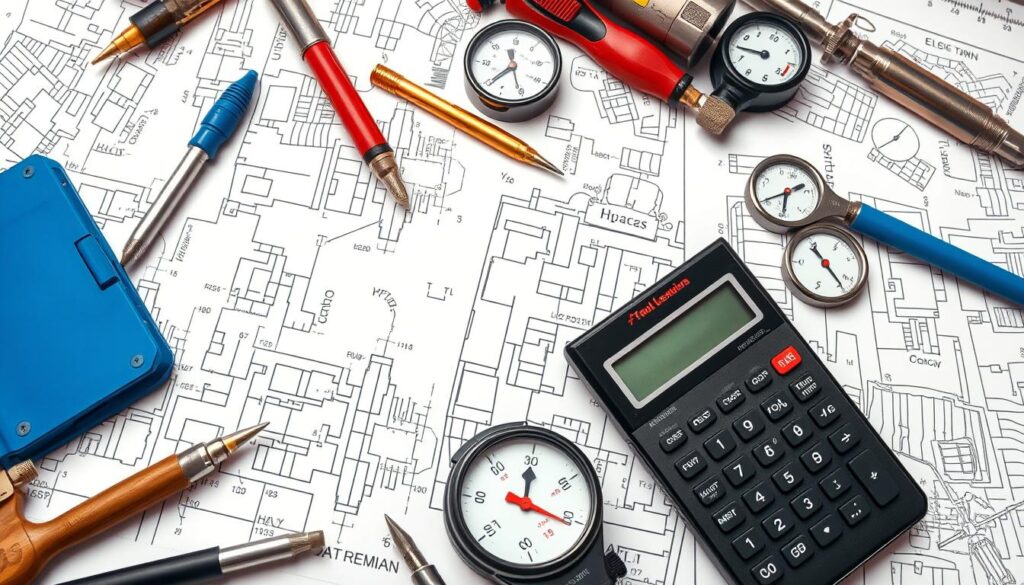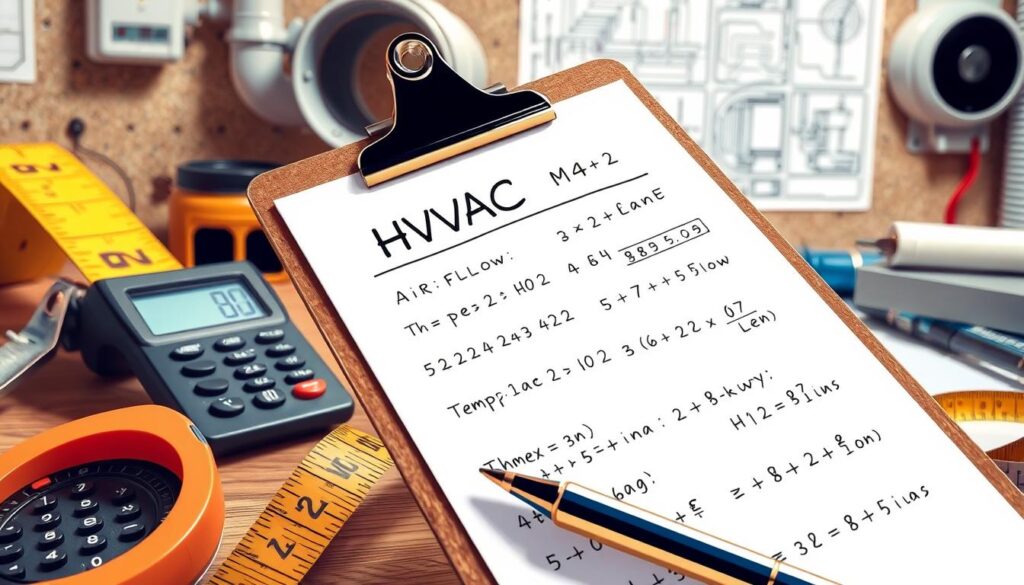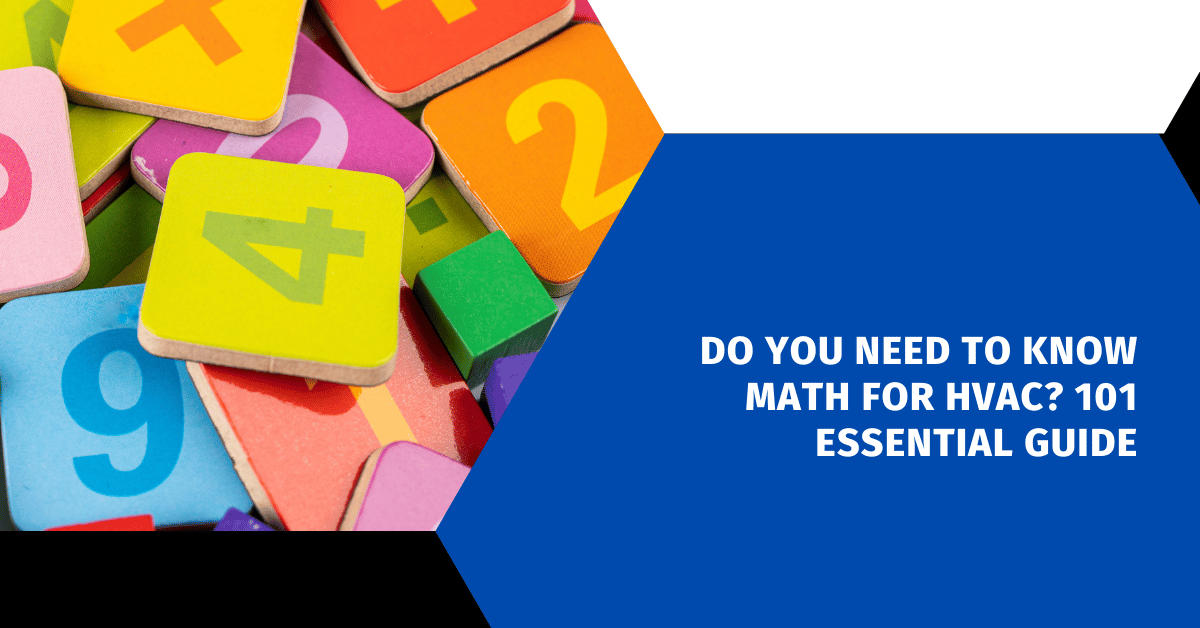Affiliate Disclosure
HVAC Guide Guys is a participant in the Amazon Services LLC Associates Program, an affiliate advertising program designed to provide a means for sites to earn advertising fees by advertising and linking to Amazon.
Do You Need to Know Math for HVAC? A surprising fact is that HVAC technicians need basic math skills. They must read tables, convert data, and use simple math like addition and subtraction. These skills are key for success in the HVAC field.
If you’re thinking about becoming an HVAC technician, you might wonder about math. The truth is, math is very important for HVAC jobs. It helps with complex calculations, reading blueprints, and fixing system problems. Math is a big part of the HVAC trade.

Key Takeaways
- HVAC technicians need to know basic math, including arithmetic, algebra, and geometry.
- Math skills are crucial for doing technical work, reading blueprints, and fixing HVAC systems.
- HVAC training programs offer hands-on learning and teach the math needed for the job.
- Certifications like EPA Section 608 and NATE require showing math skills related to HVAC.
- Continuing education and self-study help HVAC technicians get better at math.
Table of Contents
Understanding the Role of Mathematics in HVAC Systems
Being good at math is key for HVAC technicians. HVAC systems need knowledge of thermodynamics, fluid dynamics, and electrical systems. This knowledge comes from understanding different math concepts.
From simple geometry and algebra to complex calculations, math is vital. It helps HVAC pros do their job well.
Basic Mathematical Concepts Used Daily
HVAC techs use many math skills every day. They need to know:
- Geometry and measurements, like figuring out volumes, areas, and lengths
- Algebra for system load and energy efficiency checks
- Technical math for dealing with pressure, temperature, and airflow
Why Math Proficiency Matters in HVAC
Good math skills help HVAC techs do their job right. They can size equipment correctly and design efficient systems. This ensures systems work well and save energy.
Math also helps them understand system performance. They can make smart choices to improve HVAC setups.
Common Mathematical Applications
HVAC pros use math in many ways. They:
- Figure out the right size and capacity of HVAC equipment
- Calculate heating and cooling loads for system design
- Look at energy use and efficiency of HVAC systems
- Fix problems by understanding data and making calculations
- Read blueprints and technical specs that use math
By valuing math in HVAC, techs can get better at solving problems. They can also offer more effective and energy-saving solutions to clients.
Essential Math Skills Required for HVAC Technicians
If you’re thinking about becoming an HVAC technician, you’ll need to know your numbers. HVAC techs fix, install, and keep heating, cooling, and refrigeration systems running in homes and businesses.
They learn about electricity, HVAC, and how to work with gases and coolants. It’s also important to understand ducts and flue pipes. These are key to heating or cooling spaces.
They also learn about saving energy, improving air quality, and following safety rules. This includes wearing the right clothes and handling tools safely. It’s all about avoiding accidents.
HVAC systems must meet building codes for safe and efficient operation. HVAC techs need to solve problems, communicate well, and be physically strong. They also need to manage their time well.
| HVAC Technician Skills | Importance |
|---|---|
| Numerical Abilities | High |
| Quantitative Skills | High |
| Electricity and HVAC Principles | High |
| Refrigeration System Knowledge | High |
| Building Code Compliance | High |
| Problem-Solving | High |
| Communication | High |
| Mechanical Aptitude | High |
| Physical Strength and Stamina | High |
| Time Management | High |
With the right math skills, you’ll be ready to succeed as an HVAC technician. You’ll help the industry grow and thrive.
Explore Our HVAC Shop
Looking for top-rated HVAC tools, parts, and accessories? Visit our shop and find the perfect solution for your needs.
Visit the ShopDo You Need to Know Math for HVAC? The Truth Revealed
Many wonder if math is needed for an HVAC career. The answer is yes, math is key for HVAC techs. They use it for sizing systems and calculating energy efficiency.
Required Math Competency Levels
HVAC techs need to know high school math, especially geometry and algebra. These skills help them figure out duct sizes and airflow. They also help size HVAC units for buildings or homes.
Real-world Applications
Math is used every day in HVAC. Technicians use it to size and install systems right. They also use it to find energy-saving solutions and fix problems. For example, they do Manual-J Heat Load Analysis to figure out building needs.
Success Stories and Examples
Companies like Magic Touch Mechanical in Phoenix, Arizona, value math skills. They’ve worked on thousands of HVAC systems, following the Manual-J standard. This focus on detail has earned them a great reputation in Arizona’s hot summers.
One time, Magic Touch Mechanical found a home needed 6.2 tons of cooling but had a 5-ton system. They used math to suggest the right size. This ensured comfort and saved energy for their clients.
In conclusion, knowing math is crucial for HVAC techs. It helps them offer reliable, efficient, and affordable services. By mastering math, HVAC pros can thrive in this growing field.
Educational Requirements for HVAC Career Path
To start an HVAC career, you usually need a high school diploma or its equivalent. But, many HVAC training programs also ask for specific math courses from high school. These math skills are key for understanding hvac training math prerequisites and mathematics in hvac career.
Training programs, like those at UEI College, can be finished in just 10 months. They mix classroom learning with practical experience. This way, students get the skills and knowledge needed to do well in the field.
| State | HVAC Technician Employment | Employment per 1,000 Jobs |
|---|---|---|
| California | 38,370 | 2.18 |
| Florida | 33,560 | 3.64 |
| Texas | 30,670 | 2.36 |
| New York | 20,150 | 2.21 |
| Pennsylvania | 17,730 | 3.05 |
The HVAC industry is set to grow by 15% by 2026, says the Bureau of Labor Statistics (BLS). This growth comes from more demand for climate-control systems and energy efficiency in buildings.
HVAC technicians also need various certifications, like NATE Certification and specific ones for refrigerants. These certifications show they’re skilled and meet industry standards.
Getting associate’s or bachelor’s degrees in HVAC can open up more service options. This can lead to higher earnings and even starting your own HVAC business. It’s important to pick a training program that fits your career goals and offers the right experience and certifications.
Explore Our HVAC Shop
Looking for top-rated HVAC tools, parts, and accessories? Visit our shop and find the perfect solution for your needs.
Visit the ShopBasic Math Concepts Used in HVAC Work
Being good at mathematics is key for HVAC pros. They need to know geometry and measurements, algebra applications, and technical calculations. These skills help them do their job right, from installing to fixing HVAC systems.
Geometry and Measurements
The HVAC world uses geometric principles a lot. They design ductwork and plan system layouts. Knowing how to measure and calculate is vital for good airflow and system efficiency.
Algebra Applications
HVAC techs use algebraic concepts to figure out energy use and system loads. They need to understand equations for heat transfer and electrical systems. This helps them fix and improve HVAC systems.
Technical Calculations
HVAC techs do lots of technical calculations to keep systems running well. They figure out airflow, refrigerant, and electrical loads. Knowing these mathematical tools is crucial for good HVAC work.
Learning these basic math concepts is vital for HVAC pros. A strong base in geometry, algebra, and calculations means better service. It also makes HVAC systems more efficient and comfortable.
“A solid understanding of mathematics is the bedrock of HVAC excellence. It empowers technicians to tackle complex challenges and deliver exceptional results.”
Explore Our HVAC Shop
Looking for top-rated HVAC tools, parts, and accessories? Visit our shop and find the perfect solution for your needs.
Visit the ShopCareer Opportunities and Math Prerequisites
The HVAC industry is booming, with a 15% growth expected by 2026, says the Bureau of Labor Statistics. HVAC technicians are key in setting up, fixing, and keeping systems running for homes and businesses.
For math for hvac trade, employers look for candidates with some college or specialized training. This is because today’s HVAC systems are complex, needing a strong grasp of hvac technician math skills. Jobs include HVAC Professional, Service Technician, and Ammonia Refrigeration Technician, among others.
For HVAC techs, basic math is a must. They need to read tables, do simple math, and get basic algebra. But, for those aiming to be mechanical engineers or system designers, calculus is needed.
Many future technicians take vocational programs. These cover Refrigeration Fundamentals, Electricity Basics, and Comfort Systems. These programs offer hands-on learning and can be finished in 21 months. You’ll get an Associate of Occupational Science in HVAC Technology with Service Management.
“The field of HVAC is projected to require around 19,000 more mechanics and installers in the upcoming decade, according to the United States Bureau of Labor Statistics.”
With the HVAC industry’s growth and the need for math skills, those ready with a strong math background are set for success. This field is both dynamic and rewarding.

Training Programs and Mathematical Components
To work in the HVAC (Heating, Ventilation, and Air Conditioning) field, you need to know math well. HVAC training programs teach the skills needed, including math.
Classroom Instruction
HVAC training includes lots of classroom time. Students learn about geometry and measurements, algebra applications, and technical calculations. These topics are key for designing, installing, and keeping HVAC systems running.
Hands-on Training
Students also get hands-on experience. They use what they’ve learned in real-world situations. This training helps them accurately calculate load requirements, size ductwork, and troubleshoot system performance.
Certification Requirements
Certification exams test math skills. Passing these exams is key to becoming a certified HVAC technician. It shows they can apply math to HVAC work. The certification ensures HVAC pros have the math skills needed.
Math is a big part of HVAC training. By mastering these skills, students are ready for the HVAC industry’s challenges.
Practical Applications of Math in HVAC Systems
As an HVAC technician, you use math every day. It’s key for making sure heating, ventilation, and air conditioning systems work right. You need to figure out how much heat or cool air is needed and pick the right equipment size.
Measuring airflow and pressure is a big part of your job. You use math to check if the system is working well. This helps keep the air flowing right, saves energy, and avoids expensive problems later.
You also use math to find and fix problems and figure out how much a job will cost. By looking at technical data and doing the math, you can find the right parts and give clients a good price estimate.
| Mathematical Applications in HVAC | Practical Importance |
|---|---|
| Heating and Cooling Load Calculations | Determine the appropriate size and capacity of HVAC equipment for optimal performance |
| Airflow and Pressure Measurements | Ensure efficient system operation and identify any imbalances |
| Energy Efficiency Calculations | Evaluate the energy savings and return on investment for clients |
| Troubleshooting and Repair Diagnostics | Accurately identify and resolve system issues using technical data and calculations |
| Job Cost Estimations | Provide reliable and accurate cost estimates to customers |
The HVAC field is always changing, and math skills are more important than ever. By improving your math skills, you’ll be more valuable to your employer and better at serving your clients.
Explore Our HVAC Shop
Looking for top-rated HVAC tools, parts, and accessories? Visit our shop and find the perfect solution for your needs.
Visit the ShopOvercoming Math Challenges in HVAC Training
Starting your HVAC technician training can bring math challenges. But, with the right help, you can beat these obstacles. This will help you gain the math literacy for hvac technicians needed for a great career.
Study Resources
There are many study tools to help you improve your essential math for hvac professionals. You can find textbooks, online tutorials, and practice problems. These can help you learn the math needed for HVAC work.
By practicing regularly, you can build a strong math foundation. This is crucial for your HVAC career.
Support Systems
Don’t forget about the help from your training program and community. Many HVAC schools offer tutoring, study groups, and mentorship. These can be big helps if you’re struggling with math.
Reaching out to teachers or classmates can really help. It can make a big difference in your success.
Staying persistent and dedicated is key to mastering HVAC math. Use all the resources and support you can find. This way, you can develop the math literacy for hvac technicians needed to shine in your field.

“The job of an HVAC technician takes three to five years to learn, including training programs and apprenticeships.”
Technology and Mathematical Tools in Modern HVAC
The HVAC industry is changing fast. Technicians now use advanced tech and math tools to improve system performance. Smart thermostats, energy management systems, and digital tools have changed how technicians work.
To use these tools well, technicians need to know the math behind them. They must understand electricity and voltage imbalances, horsepower calculations, and thermal load formulas. This knowledge helps them make smart choices about system adjustments and upkeep.
- Calculations regarding electricity and voltage imbalances: Percent unbalance = (8/220) x 100 = 3.636363636%, Percent temperature rise = 2 x (3.636363636)² = 26.4462809864
- Formulas related to HVAC work and horsepower: Horsepower (HP) = 33,000 ft-lbf of work in one minute, HP = 745.7 watts, Metric HP = 735.5 watts, Kilowatt (KW) = 3413 British Thermal Units (BTU)
- HVAC specific terms and formulas: Ton of Refrigeration: 12,000 BTU per hour, Specific Density of Air = 1 / 13.33, Raising one pound of standard air one degree Fahrenheit requires .24 BTUs
- Additional utility formulas: Total Heat (BTU/hr.) = 4.5 x cubic feet per minute (CFM) x Δh (std. air), Sensible Heat (BTU/hr) = 1.1 x CFM x Δt (std. air), Latent Heat (BTU/hr) = 0.69 x CFM x Δgr. (std. air)
By learning these math concepts, technicians can improve their quantitative skills for hvac workers. This lets them make better decisions, increase system efficiency, and offer better services. The mix of technology and math is key for modern HVAC technicians, pushing the industry forward.
“The more you know, the more you can do. Understanding the math behind HVAC systems is crucial for maximizing their performance and efficiency.”
Explore Our HVAC Shop
Looking for top-rated HVAC tools, parts, and accessories? Visit our shop and find the perfect solution for your needs.
Visit the ShopBuilding Confidence in HVAC Math Skills
Are you thinking about how math fits into being an HVAC technician? The truth is, math for HVAC trade is key to success. Getting better at numerical abilities for HVAC jobs can really boost your training and career.
Practicing regularly is a big part of building confidence. Use what you learn in class to solve real HVAC problems. This hands-on practice will make you more comfortable using math on the job.
Getting feedback from teachers or experienced HVAC pros is also super helpful. They can show you the most important math skills for the job. You can also learn more by going to workshops and taking extra classes.
| Skill | Importance in HVAC | Practical Application |
|---|---|---|
| Geometry and Measurements | Essential for accurately sizing and installing HVAC systems | Calculating ductwork dimensions, pipe sizing, and airflow requirements |
| Algebra | Crucial for understanding HVAC system performance and efficiency | Solving equations for refrigerant charge, heat load calculations, and energy efficiency calculations |
| Technical Calculations | Fundamental for troubleshooting and maintaining HVAC systems | Determining airflow, pressure, temperature, and electrical measurements |
With hard work and a desire to learn, you can beat any math for HVAC trade hurdles. Mastering numerical abilities for HVAC jobs will help you become a top-notch HVAC technician.
“Proficiency in math is not just a requirement; it’s a superpower for HVAC technicians. Embrace it, and you’ll unlock a world of possibilities.”
Conclusion
The HVAC industry is changing fast, and skilled technicians are needed more than ever. You don’t need to be a math expert, but knowing the basics is key. These skills help you do complex tasks and improve energy use.
Starting or growing in HVAC means learning math is crucial. Courses like the 050 Applied Math Course from HVACRedu.net can boost your math skills. This knowledge helps you succeed in HVAC and make systems more efficient.
Being good at math in HVAC is more than just numbers. It’s about solving problems and designing systems. So, focus on improving your math skills to excel in your HVAC career.

